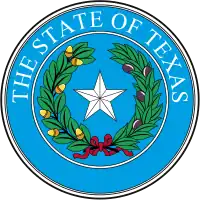Texas Independence Referendum Act
The Texas Independence Referendum Act (HB 3596), commonly shortened to TEXIT, is pending Texas state legislation which, if passed, would call for a state referendum on the secession of Texas from the United States. While prior versions of the legislation have been introduced under similar titles, the most recent version was introduced by state representative Bryan Slaton on March 6, 2023. [1][2] The bill failed to get out of committee before the end of the regular session.[3]
| Texas Independence Referendum Act | |
|---|---|
 | |
| Texas Legislature | |
| |
| Citation | HB 3596 |
| Introduced by | Bryan Slaton (R–2) |
| Status: Not passed | |
Background
In December 2020, when the Supreme Court refused to hear Texas' lawsuit in Texas v. Pennsylvania, the chair of the Texas GOP, Allen West, suggested that Texas and other like-minded states could leave the Union.[4][5][6] In 2022, the Republican Party of Texas added a statement in its party platform that called for a referendum over secession in 2023.[7]
Texan secession from the United States is noted as a fringe but popular movement within the Lone Star state, especially with "Texit" becoming a popular rallying slogan. As early as 2016, it was noted that 212,000 accounts had "liked" a Facebook page focused on Texan secession.[8]
2021 bill
On January 26, 2021, the first version of the Texas Independence Referendum Act (HB 1359), a bill to provide for a nonbinding statewide referendum on secession, was filed by Texas House member Kyle Biedermann.[9] The bill was referred to the State Affairs committee but it was never given a hearing or voted on by the committee before the end of the session.
Provisions
If passed by the legislature and signed by the governor, the legislation calls for the 2023 general election in Texas to include a referendum on whether the state should secede from the Union. The proposed legislation outlines that the referendum will be listed under "Referendum Proposition". If the bill succeeds, the state will form a committee tasked with planning the next steps in the state seceding from the Union. The committee is designated specifically to make recommendations on amendments to the Constitution of Texas, creating new elected offices, renaming the state, and other procedures for the building of a nation. The legislation specifically recommends free trade agreements, a temporary currency union, and a common travel agreement. The committee will be abolished once the calendar year of 2025 begins.[10][11]
Legislative history
The bill was introduced on March 6, 2023, the 187th anniversary of the Battle of the Alamo.[11] Like the previous version of the bill, HB 3596 was referred to the State Affairs Committee but was never given a hearing or voted on by the committee before the end of the session. [12]
Support and opposition
The point has been raised that Texas v. White, the 1869 Supreme Court case which ruled that unilateral secession from the United States is illegal, would prevent the enactment of the Texas Independent Referendum Act.
Proponents supporting the act, including Biedermann and Slaton, all state that the people of Texas should be given the right to vote on whether they wish to stay in the Union.[13] Upon introducing the 2023 bill, Slaton further stated that the state constitution is "clear that all political power resides in the people". Slaton further alleges "decades of continuous abuse of our rights and liberties by the federal government".[14] Proponents have also stated that the Texan people have a right to self-determination and a “forced union is not want Texans want”.
References
- Ramirez, Nikki McCann (March 6, 2023). "Texas Republican Introduces Bill Calling for Vote on Secession". Rolling Stone. Retrieved March 9, 2023.
- Schnell, Mychael (March 6, 2023). "Texas lawmaker files 'TEXIT' bill to spur vote on exploring secession from US". The Hill. Retrieved March 9, 2023.
- "History of HB 3596". Texas Legislature Online. Texas Legislature. Retrieved July 13, 2023.
- Goldmacher, Shane (December 11, 2020). "Democrats, and Even Some Republicans, Cheer as Justices Spurn Trump". The New York Times. Archived from the original on December 12, 2020. Retrieved December 11, 2020.
- Merchant, Omaan; Durkin Richer, Alanna; Sherman, Mark (December 11, 2020). "Supreme Court rejects Republican attack on Biden victory". The Associated Press. Archived from the original on December 11, 2020. Retrieved December 11, 2020.
- Alexrod, Tal (December 11, 2020). "Texas GOP chair floats secession for 'law-abiding states' after Supreme Court defeat". The Hill. Archived from the original on December 12, 2020. Retrieved December 11, 2020.
- Chappel, Bill (June 20, 2022). "Texas GOP's new platform says Biden didn't really win. It also calls for secession". NPR. Archived from the original on May 24, 2023.
- McMurray, Cort (July 18, 2016). "Texit, our Texit". Houston Chronicle. Retrieved March 9, 2023.
- "Herman: Texas secession bill filed in House". Austin American-Statesman. January 26, 2021. Archived from the original on January 26, 2021. Retrieved January 26, 2021.
- Texas State Legislature (March 6, 2023). "HB 3569 An act relating to proposing a referendum to the people of the State of Texas on the question of whether this state should reassert its status as an independent nation" (PDF). Texas Legislature. Retrieved March 9, 2023.
- Garcia, Sonia (March 7, 2023). "A new Texas bill seeks vote on state's independence from US". Houston Chronicle. Retrieved March 9, 2023.
- "History of HB 3596". Texas Legislature Online. Texas Legislature. Retrieved July 13, 2023.
- November 2022 16, Peter Holley (October 10, 2022). "Are Texas Republicans Serious About Secession?". Texas Monthly. Retrieved March 10, 2023.
- Christ, Lacey (March 6, 2023). "Texas state representative introduces bill to vote on secession". Fox News. Retrieved March 10, 2023.